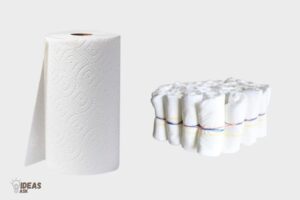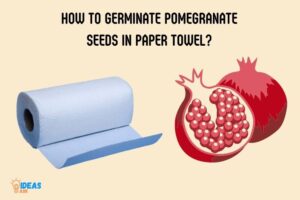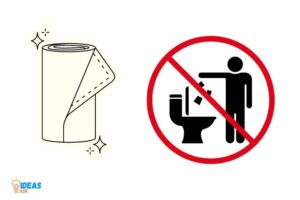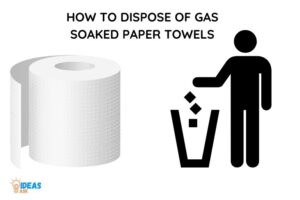How Clean Are Paper Towels? Hygiene Revealed!
While paper towels may appear clean to the naked eye, they are not entirely free from bacteria and other contaminants. Their manufacturing process and subsequent handling can introduce various microorganisms.
Paper towels are one of the most commonly used hygiene products. However, they are not as clean as we assume.
During the manufacturing process, paper towels come into contact with machinery and human hands that may carry bacteria.
In addition, once packaged and shipped, these towels can pick up additional bacteria during transportation and storage.
While it’s true that paper towels can harbor bacteria, it’s important to note that the levels are generally low and not typically harmful.
Furthermore, the risk of potential contamination from a paper towel is significantly lower compared to reusable cloth towels, which can accumulate and spread bacteria over time if not properly washed.
Comparing the Cleanliness of Different Brand Paper Towels
| Brand | Absorbency Rate | Lint Generation | Tear Resistance | Overall Cleanliness Score |
|---|---|---|---|---|
| Bounty | High | Low | High | Excellent |
| Scott | Medium | Medium | High | Good |
| Brawny | High | Low | Medium | Excellent |
| Viva | High | High | High | Good |
| Sparkle | Low | Medium | Low | Fair |
Key Takeaway
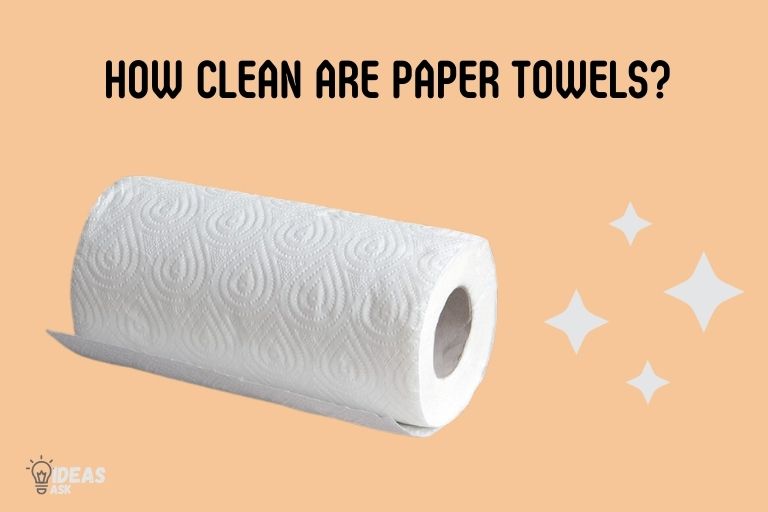
Five Facts About the Cleanliness of Paper Towels
The Science Behind Paper Towels: A Closer Look At Their Composition And Functionality
Understanding The Different Types Of Paper Towels And Their Applications
Paper towels are manufactured in different types and sizes according to their applications.
Some crucial types of the paper towels are:
- Multi-fold towels: Multi-fold paper towels are the most common type found in public washrooms, and they are mainly used for hand-drying.
- C-fold towels: C-fold paper towels are designed in such a way that they can be dispensed one at a time, hence reducing wastage.
- Roll towels: Roll towels are commonly used in kitchens because of their ability to clean spills, wipe surfaces, and dry hands.
- Kitchen towels: These types of paper towels are perfect for cleaning kitchen spills and wiping counters.
Examining The Ingredients Used In Creating Paper Towels
The following ingredients are used in the manufacturing of paper towels:
- Chemical wood pulp: The base material for paper towels is chemical wood pulp, which is derived from timber harvested from pine and spruce trees.
- Water: Water is a crucial ingredient when making paper towels. It is used to suspend the fibers in the pulp and transfer them onto the paper machine to form the paper towel.
- Bleach: The chemical bleaching process is used to bleach the paper towel, giving it a clean white appearance.
- Additives: Different additives such as starch and softening agents are introduced to the paper-making mix to enhance its strength, absorbency and softness.
How Do Paper Towels Work To Clean Our Surfaces?
Paper towels are made of cellulose fibers, which are highly absorbent. When you use a paper towel to clean a surface, the water is drawn into the towel, leaving the surface dry.
- Absorbency: Paper towels are excellent at absorbing fluids, which makes them perfect for cleaning spills.
- Strength: The strength of the paper towel enables it to be used repeatedly without shredding or falling apart.
- Texture: The texture of the paper towel allows it to remove dirt and grime from surfaces easily. It acts like a sponge and can soak up a lot of spills, keeping the surface dry and clean.
Paper towels are an essential item in our daily lives and are widely used for cleaning purposes.
Understanding the different types of paper towels available, the ingredients used in producing them, as well as how they function is important for determining their suitability for different applications.
The Environmental Impacts Of Paper Towels: Separating Facts From Fiction
Dispelling The Myths About The Environmental Effects Of Paper Towels
Despite their ubiquitous presence in households and public restrooms, paper towels have been the subject of much debate regarding their environmental impact.
However, many prevailing beliefs about the harm caused by paper towels are based on misconceptions.
Here are some of the myths about the environmental impact of paper towels that need to be debunked:
- Myth 1: Using hand dryers is always better for the environment than paper towels.
- Myth 2: All paper towels are made from virgin trees.
- Myth 3: Recycled paper towels are always the more environmentally friendly option.
- Myth 4: Composting paper towels is always a viable solution.
These myths have led to confusion about whether paper towels are an environmentally responsible choice, but the truth is more nuanced.
Understanding The Real Environmental Consequences Of Paper Towels
While it’s true that paper towels have a carbon footprint, their overall environmental impact is highly dependent on various factors, such as their manufacturing process, their materials, and how they are disposed of.
Here are the key environmental consequences of paper towels:
- Issue 1: Deforestation
- Explanation: Paper towels are a significant contributor to deforestation since many brands use virgin wood pulp to manufacture them.
- Issue 2: Landfills
- Explanation: When paper towels go to landfills, they not only take up space but also release methane gas as they decompose.
- Issue 3: Manufacturing
- Explanation: Manufacturing paper towels can lead to greenhouse gas emissions, air pollution, and water pollution.
Therefore, it’s essential to weigh the impact of paper towels on the environment versus the convenience they offer before deciding how to use them.
The Importance Of Making Informed Decisions About Choosing Paper Towels
As we’ve seen, the effects of paper towels on the environment are more complex than they might seem at first. Therefore, it’s crucial to make informed decisions when choosing to use them.
Here are some factors to consider:
- Materials: Look for paper towels made from recycled materials or bamboo to reduce the product’s environmental impact.
- Usage: Minimize your usage by opting for hand dryers when possible or using washable towels at home.
- Disposal: If you have to use paper towels, dispose of them properly by recycling them or composting them if possible.
Ultimately, the key takeaway is that making informed decisions about paper towel usage can go a long way in reducing their environmental impact.
How Safe And Sanitary Are Paper Towels For Cleaning?
How Clean Are Paper Towels?
You may think that paper towels are a hygienic and safe solution for cleaning, but there are some potential risks you should consider.
We’ll explore the safety and hygiene aspects of using paper towels for cleaning, including the risks of cross-contamination and the importance of proper usage, the role of chemicals in manufacturing paper towels, and potential health risks.
The Risk Of Cross-Contamination And The Importance Of Proper Usage
Using paper towels incorrectly can lead to cross-contamination, especially if you use the same towel on multiple surfaces.
Here are some important things to keep in mind when using paper towels for cleaning:
- Always use a fresh paper towel when cleaning a new surface to avoid spreading germs.
- Never reuse a paper towel on another surface, as it can transfer bacteria from one surface to another.
- Avoid touching your face, mouth, or eyes while using a paper towel to prevent contamination.
The Role Of Chemicals Used In Manufacturing Paper Towels
While paper towels may seem harmless, they undergo a chemical process during manufacturing that involves bleaching and dyeing.
Here are some chemicals used in manufacturing paper towels that you should be aware of:
- Chlorine dioxide: A bleaching agent that can cause respiratory problems and skin irritation when inhaled or touched.
- Formaldehyde: Used as a preservative, this chemical can cause allergic reactions in some people.
- Dyes: Some paper towels are dyed with synthetic chemicals that can cause skin irritation and even cancer in some cases.
Potential Health Risks And Safety Measures To Consider
Using paper towels incorrectly or being exposed to their chemicals can pose some health risks.
Here are some safety measures you can take:
- Use paper towels in a well-ventilated area to minimize inhaling the chemicals used in manufacturing.
- If you have sensitive skin or allergies, it’s best to avoid using dyed paper towels.
- Dispose of used paper towels properly to avoid spreading germs.
While paper towels are a convenient and widely used cleaning solution, it’s essential to use them safely and correctly to avoid cross-contamination and potential health risks. By following these tips, you can ensure that your cleaning routine is both effective and safe.
Alternatives To Using Paper Towels: Are They Worth The Switch?
Discovering Alternative Cleaning Methods And Tools
If you’re looking for an eco-friendlier and sustainable alternative to using paper towels, there are a number of options available.
Here are some alternative cleaning methods and tools that can help you reduce waste:
- Reusable cloths: Made from cotton, microfiber or bamboo material, reusable cloths offer a great alternative to paper towels. They are washable, absorbent and durable, making them ideal for wiping spills, cleaning surfaces and dusting.
- Sponges: Sponges make a great alternative to paper towels as they are reusable and easy to clean. They are ideal for washing dishes, cleaning sinks, and wiping countertops.
- Old t-shirts or towels: Instead of throwing away old t-shirts or towels, cut them up into cleaning rags. These can be used in place of paper towels and be easily washed after use.
Understanding The Costs And Benefits Of Switching From Paper Towels
Switching from paper towels to alternative cleaning methods and tools has both costs and benefits.
Here are some things to consider before making the switch:
- Cost: While it may seem expensive at first, investing in reusable cleaning tools will ultimately save you money in the long run as you won’t need to constantly restock paper towels.
- Health benefits: Using eco-friendly and sustainable cleaning products is not only good for the environment, but it’s also beneficial for your family’s health. Traditional paper towels can contain harmful chemicals that can potentially harm your health.
- Environmental benefits: By using reusable cleaning tools, you are reducing waste and helping to conserve natural resources. Plus, you’ll reduce your carbon footprint by not contributing to the manufacturing and transportation of single-use paper towels.
Tips For Making The Transition
Making the switch from paper towels to alternative cleaning methods and tools may seem daunting, but it’s easier than you think.
Here are some tips to help you make the transition:
- Start by gradually reducing your paper towel usage and gradually introducing reusable cleaning tools.
- Get into the habit of washing your reusable cloths or towels regularly to keep them fresh and clean.
- Keep a stack of reusable cloths in your kitchen or bathroom for easy access and convenience.
- Make sure to properly dispose of old paper towels by composting or recycling them.
By following these tips, you can easily switch to eco-friendly and sustainable cleaning methods that will benefit both your home and the environment.
FAQ On the Cleanliness of Paper Towels
Are Paper Towels Environmentally Friendly?
Paper towels are not environmentally friendly due to their one-time use and contribution to deforestation.
How Do Paper Towels Compare To Hand Dryers?
Paper towels and hand dryers both have pros and cons. Paper towels are more hygienic while hand dryers are more sustainable.
Can Recycled Paper Towels Be Used Instead?
Yes, recycled paper towels are a better option as they reduce deforestation and waste in landfills.
What Is The Most Hygienic Way To Dry Hands?
Using a paper towel or a hand dryer are both hygienic options. It is important to properly wash hands first.
Conclusion
Overall, it is clear that paper towels are an essential tool for keeping our homes and workplaces clean. While they may not be perfect, it is still the best option for people who need to wipe surfaces or clean up spills quickly.
There is no need to worry about bacteria if we use paper towels properly and dispose of them after use. However, it is essential to keep in mind that using paper towels excessively may contribute to environmental issues.
Finding a balance between cleanliness and eco-friendliness is a crucial decision that we all have to make. And while we cannot completely avoid using paper towels, we can still reduce our carbon footprint by minimizing our usage.
As long as we use paper towels attentively and conscientiously, they are a reliable and practical solution to our daily cleaning needs.

